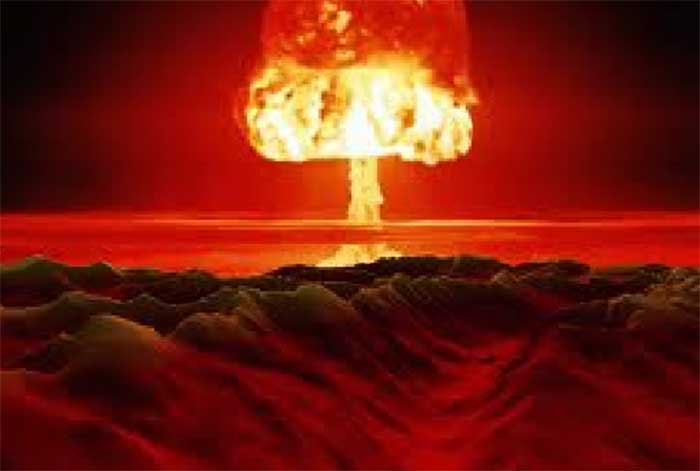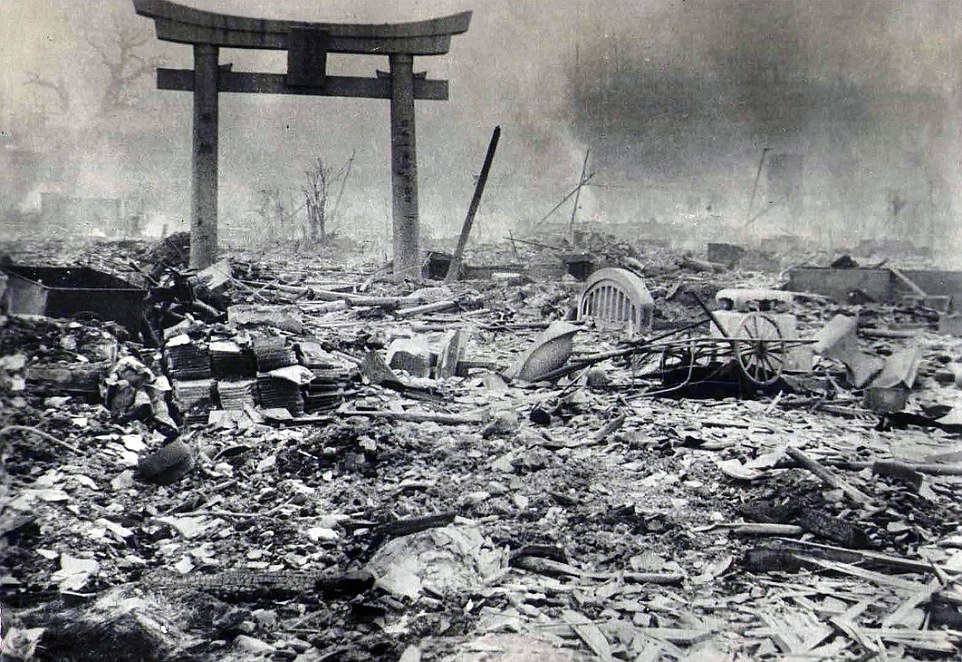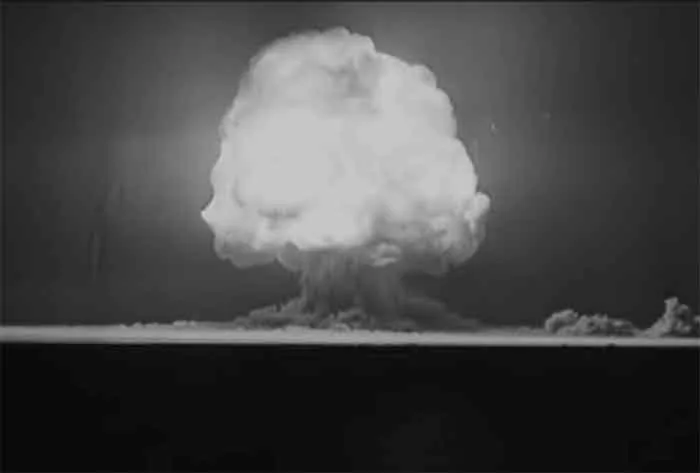
With two nuclear superpowers involved in the war in Ukraine, coupled with the recent debut of the film “Oppenheimer,” the possibility of nuclear war has once again reared its ugly head. Given this, the suggestion that nuclear weapons might be a “blessing in disguise” will strike many readers as not only impossible but preposterous, for this suggestion is based on the premise that something that initially seems bad or unlucky can change into the cause of something good later on. Is there anyone who would dare suggest the existence of nuclear weapons could lead to something “good” happening in the future?
This question is particularly relevant to me, for I live in Kyoto, Japan, less than a 90-minute train ride from Hiroshima, ground zero of nuclear warfare. The atomic bomb dropped directly on the downtown area of Hiroshima on August 6, 1945 resulted in the instant death of between 70,000 to 80,000 mostly civilian inhabitants of that city and the eventual deaths from burns, radiation and other injuries of an additional 70,000. A further approximately 40,000 were killed three days later in a nuclear attack on Nagasaki. Is there any way this horrific destruction can be identified as a “blessing”?
In fact, after visiting the Hiroshima Peace Museum many years ago I was left numb by the scale of the devastation and the utter cruelty depicted in the exhibits I saw there. I was so deeply affected that I later went out into the gardens surrounding the museum and sat weeping, not least of all because I knew that it was my country, the United States of America, that had dropped atomic bombs on both Hiroshima and Nagasaki.
However, as I wept, with head bowed, a strange phenomenon occurred. I heard the screaming voices of a crowd. I immediately recalled an exhibit I’d just seen in which severely wounded survivors of the bombing cried out, asking for “water, water”! They staggered and crawled to the nearby Honkawa river where, upon quenching their thirst, they died, turning the river into a floating graveyard.
At first, I wondered whether, in my grief, I had begun to hallucinate. Then, coming to my senses, I looked up and saw a series of bright lights shining in the distance. Was this, too, a hallucination? I quickly realized it was not, for I recognized it for what it was – a nearby baseball stadium packed with fans cheering on their respective teams. While I was relieved to realize I wasn’t hallucinating, the voices of what I initially took to be the surviving bomb victims begging for water have remained with me these many years later. I’m sure they always will.
Needless to say, whether the use of atomic bombs on Hiroshima and Nagasaki was necessary or unnecessary, moral or immoral, has long been intensely debated as well it should be. That debate, however, is not relevant here. Instead, the question to be explored is whether under any conceivable scenario the use of atomic bombs dropped on Japan could be conceived of as any kind of “blessing”?
To answer this question, I suggest we need to take an honest and, as much as possible, a dispassionate look at the events that unfolded in the aftermath of the bombing of Hiroshima and Nagasaki.
The first undeniable result of the use of atomic bombs is that in the ensuring seventy-eight years they have never been used again. This is true despite, or, as some would argue because of, the proliferation of atomic weaponry, now possessed by nine countries. Can the decades long, non-use of atomic weaponry be said to apply to any other weapon? For example, ever though the use of chemical weapons was formally outlawed in 1997, they continue to be used though, so far at least, on a limited scale.
This raises the question of why atomic weaponry hasn’t been used since 1945? That is to say, why, despite the many wars that the US and other nations have fought in the interim period, the use of atomic weaponry has been avoided. Not even the subsequent development of smaller, battlefield “tactical” nuclear weapons has led to their use. Why not?
One is tempted to answer that their non-use is a result of their great destructive power, the gross inhumanity they represent. Yet, despite their non-use we have seen nuclear weapons included in the strategic planning of all states that currently possess them. As is well known, the most frequently used explanation for their non-use is referred to by the acronym “MAD” or “mutual assured destruction.”
MAD is a doctrine of military strategy and national security policy which posits that a full-scale use of nuclear weapons by an attacker on a nuclear-armed defender with second-strike capabilities would cause the complete annihilation of both the attacker and the defender (if not humanity itself). It is based on the theory of rational deterrence, which holds that the threat of using powerful weapons against the enemy prevents the enemy’s use of those same weapons. The strategy assumes that, once armed with nuclear weapons, neither side has any incentive to initiate a conflict or, for that matter, to disarm.
For his part, Robert Oppenheimer likened the thinking behind MAD to two scorpions in a bottle, each capable of killing the other, but only at the risk of his own life.
Looking at war in the Ukraine today, it can be said that, threats aside, none of the belligerent powers have demonstrated the intent to use nuclear weapons in battle, either tactical or strategic. This is one ‘red line’ that appears to be holding even while other red lines have been crossed one after another. Why? Is it not because all parties recognize, once again, the reality of MAD were any of them to use nuclear weapons, large or small?
For example, looking back at the hundreds of wars that have been fought on the European continent over the centuries, is there any reason to doubt that in the absence of nuclear weapons the countries involved in the war in Ukraine would have, by this time, failed to join in an all-out war, very possibly spreading to all of Europe and beyond? Likewise, if war between the US and China is to be avoided will it not be because, once again, the MAD strategy is in the minds of the civilian and military leaders of the two countries?
When looking at today’s world as dispassionately as possible, don’t we see that now, as in the past, major and minor powers alike continue to play the same game as centuries if not millennia ago, i.e., my tribe (today’s nation) first, typically cloaked in the rhetoric of pursuing “national interest.” And, of course, “national interest” is typically used as a euphemism to justify or promote the economic interests of a country’s most powerful or dominant voices.
Even while recognizing the truth of what has been said, many readers will nevertheless object to the use of MAD as the only hope for the continued avoidance of nuclear war. They would, for example, point to the Treaty on the Prohibition of Nuclear Weapons (TPNW) as an example of the possibility of creating legally binding international agreements to comprehensively prohibit nuclear weapons with the ultimate goal being their total elimination. As of September 22, 2022, 68 states had ratified or acceded to the treaty.
For those nations party to it, the treaty prohibits the development, testing, production, stockpiling, stationing, transfer, use or threat of use of nuclear weapons. For nuclear armed states joining the treaty, it provides for a time-bound framework for negotiations leading to the verified and irreversible elimination of its nuclear weapons program.
The very major if not insurmountable obstacle to this treaty is that five of the nuclear-armed states – the United States, Russia, Britain, France and China have all rejected calls for the start of negotiations on a comprehensive nuclear weapons convention. Indeed, a number of them, including the United States and Russia, have expressed explicit opposition. Many of the non-nuclear-armed members of the North Atlantic Treaty Organization (NATO), along with Australia and Japan, are also resistant to a ban treaty, as they believe that US nuclear weapons enhance their security.
Following the treaty’s adoption, the permanent missions of the United States, the United Kingdom and France issued a joint statement indicating that they did not intend “to sign, ratify or ever become party to it.” These countries claimed that the treaty clearly disregarded the realities of the international security environment and said accession to it was “incompatible with the policy of nuclear deterrence, which has been essential to keeping the peace in Europe and North Asia for over 70 years.”
While I personally find hope in the TPNW for the future and fully support it, the blunt reality is that not one state actually possessing nuclear weapons has signed this treaty nor agreed to even consider giving up its nuclear weapons. Nor does there appear any hope, at least in the short term, of one or more nuclear states ever voluntarily agreeing to eliminate their nuclear arsenal.
As bitter a pill as it may be for many, this author included, the reality of today’s world is that, in terms of ‘big power politics’ the strategic doctrine of MAD still remains the dominant theme in determining foreign policy, especially in the realm of war and peace. Viewed from within the context of ‘human nature’ this is not surprising for as psychologist Jim Taylor has noted:
“The human instinct to survive is our most powerful drive. Since animals climbed out of the primordial muck and as our early ancestors rose from all fours to walk upright, evolution has been guided by its ability to help us survive and reproduce. Just about everything that humans have become serves that essential purpose, in how we think, what emotions we experience, and the ways we behave and interact with others.”
Thus, as inhumane as it may be, and, in fact, as inhumane as it is, advent of the nuclear age cannot, I reluctantly suggest, but be regarded as a “blessing in disguise.” This is because for the first time in recorded human history we homo sapiens have it within our power to destroy ourselves if we chose to do so whether out of greed and lust for power or just plain old ignorance, i.e., our ignorance or failure to recognize the humanity of our fellows on spaceship earth.
In short, if we are brutally honest with ourselves and the world we inhabit, and as much as we would like to deny it, we cannot escape the plain, hard truth – the future (or lack thereof) of humanity rests solely in our hands. The remaining question is whether we will collectively choose to make nuclear weapons a “blessing in disguise” through their abolition, if only out of fear of the consequences if we fail to do so. Or, on the contrary, will nuclear weapons become (or continue to be) the ultimate curse leading, sooner or later, to our collective annihilation?
The choice is ours.
Brian Victoria, Ph.D., Senior Research Fellow, Oxford Centre for Buddhist Studies














































